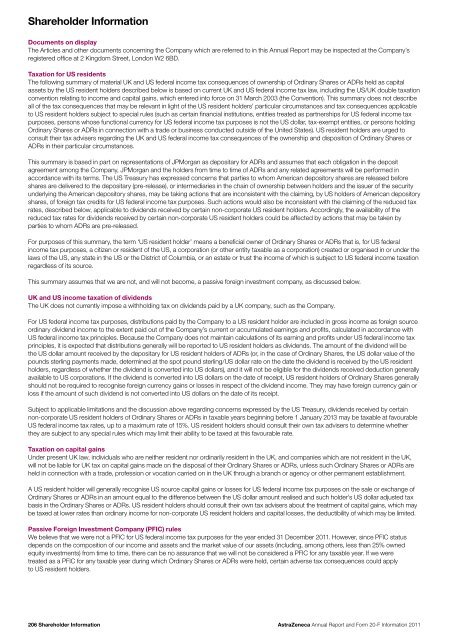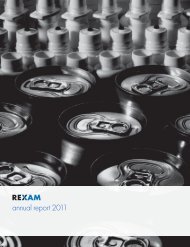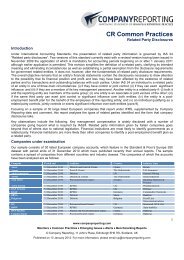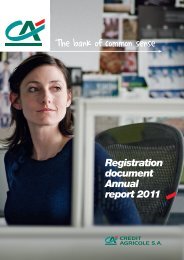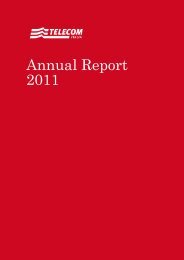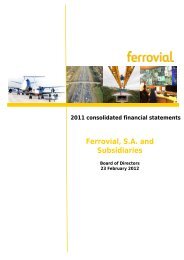AstraZeneca Annual Report and Form 20-F Information 2011
AstraZeneca Annual Report and Form 20-F Information 2011
AstraZeneca Annual Report and Form 20-F Information 2011
- No tags were found...
Create successful ePaper yourself
Turn your PDF publications into a flip-book with our unique Google optimized e-Paper software.
Shareholder <strong>Information</strong>Documents on displayThe Articles <strong>and</strong> other documents concerning the Company which are referred to in this <strong>Annual</strong> <strong>Report</strong> may be inspected at the Company’sregistered office at 2 Kingdom Street, London W2 6BD.Taxation for US residentsThe following summary of material UK <strong>and</strong> US federal income tax consequences of ownership of Ordinary Shares or ADRs held as capitalassets by the US resident holders described below is based on current UK <strong>and</strong> US federal income tax law, including the US/UK double taxationconvention relating to income <strong>and</strong> capital gains, which entered into force on 31 March <strong>20</strong>03 (the Convention). This summary does not describeall of the tax consequences that may be relevant in light of the US resident holders’ particular circumstances <strong>and</strong> tax consequences applicableto US resident holders subject to special rules (such as certain financial institutions, entities treated as partnerships for US federal income taxpurposes, persons whose functional currency for US federal income tax purposes is not the US dollar, tax-exempt entities, or persons holdingOrdinary Shares or ADRs in connection with a trade or business conducted outside of the United States). US resident holders are urged toconsult their tax advisers regarding the UK <strong>and</strong> US federal income tax consequences of the ownership <strong>and</strong> disposition of Ordinary Shares orADRs in their particular circumstances.This summary is based in part on representations of JPMorgan as depositary for ADRs <strong>and</strong> assumes that each obligation in the depositagreement among the Company, JPMorgan <strong>and</strong> the holders from time to time of ADRs <strong>and</strong> any related agreements will be performed inaccordance with its terms. The US Treasury has expressed concerns that parties to whom American depository shares are released beforeshares are delivered to the depositary (pre-release), or intermediaries in the chain of ownership between holders <strong>and</strong> the issuer of the securityunderlying the American depository shares, may be taking actions that are inconsistent with the claiming, by US holders of American depositoryshares, of foreign tax credits for US federal income tax purposes. Such actions would also be inconsistent with the claiming of the reduced taxrates, described below, applicable to dividends received by certain non-corporate US resident holders. Accordingly, the availability of thereduced tax rates for dividends received by certain non-corporate US resident holders could be affected by actions that may be taken byparties to whom ADRs are pre-released.For purposes of this summary, the term ‘US resident holder’ means a beneficial owner of Ordinary Shares or ADRs that is, for US federalincome tax purposes, a citizen or resident of the US, a corporation (or other entity taxable as a corporation) created or organised in or under thelaws of the US, any state in the US or the District of Columbia, or an estate or trust the income of which is subject to US federal income taxationregardless of its source.This summary assumes that we are not, <strong>and</strong> will not become, a passive foreign investment company, as discussed below.UK <strong>and</strong> US income taxation of dividendsThe UK does not currently impose a withholding tax on dividends paid by a UK company, such as the Company.For US federal income tax purposes, distributions paid by the Company to a US resident holder are included in gross income as foreign sourceordinary dividend income to the extent paid out of the Company’s current or accumulated earnings <strong>and</strong> profits, calculated in accordance withUS federal income tax principles. Because the Company does not maintain calculations of its earning <strong>and</strong> profits under US federal income taxprinciples, it is expected that distributions generally will be reported to US resident holders as dividends. The amount of the dividend will bethe US dollar amount received by the depositary for US resident holders of ADRs (or, in the case of Ordinary Shares, the US dollar value of thepounds sterling payments made, determined at the spot pound sterling/US dollar rate on the date the dividend is received by the US residentholders, regardless of whether the dividend is converted into US dollars), <strong>and</strong> it will not be eligible for the dividends received deduction generallyavailable to US corporations. If the dividend is converted into US dollars on the date of receipt, US resident holders of Ordinary Shares generallyshould not be required to recognise foreign currency gains or losses in respect of the dividend income. They may have foreign currency gain orloss if the amount of such dividend is not converted into US dollars on the date of its receipt.Subject to applicable limitations <strong>and</strong> the discussion above regarding concerns expressed by the US Treasury, dividends received by certainnon-corporate US resident holders of Ordinary Shares or ADRs in taxable years beginning before 1 January <strong>20</strong>13 may be taxable at favourableUS federal income tax rates, up to a maximum rate of 15%. US resident holders should consult their own tax advisers to determine whetherthey are subject to any special rules which may limit their ability to be taxed at this favourable rate.Taxation on capital gainsUnder present UK law, individuals who are neither resident nor ordinarily resident in the UK, <strong>and</strong> companies which are not resident in the UK,will not be liable for UK tax on capital gains made on the disposal of their Ordinary Shares or ADRs, unless such Ordinary Shares or ADRs areheld in connection with a trade, profession or vocation carried on in the UK through a branch or agency or other permanent establishment.A US resident holder will generally recognise US source capital gains or losses for US federal income tax purposes on the sale or exchange ofOrdinary Shares or ADRs in an amount equal to the difference between the US dollar amount realised <strong>and</strong> such holder’s US dollar adjusted taxbasis in the Ordinary Shares or ADRs. US resident holders should consult their own tax advisers about the treatment of capital gains, which maybe taxed at lower rates than ordinary income for non-corporate US resident holders <strong>and</strong> capital losses, the deductibility of which may be limited.Passive Foreign Investment Company (PFIC) rulesWe believe that we were not a PFIC for US federal income tax purposes for the year ended 31 December <strong>20</strong>11. However, since PFIC statusdepends on the composition of our income <strong>and</strong> assets <strong>and</strong> the market value of our assets (including, among others, less than 25% ownedequity investments) from time to time, there can be no assurance that we will not be considered a PFIC for any taxable year. If we weretreated as a PFIC for any taxable year during which Ordinary Shares or ADRs were held, certain adverse tax consequences could applyto US resident holders.<strong>20</strong>6 Shareholder <strong>Information</strong><strong>AstraZeneca</strong> <strong>Annual</strong> <strong>Report</strong> <strong>and</strong> <strong>Form</strong> <strong>20</strong>-F <strong>Information</strong> <strong>20</strong>11


